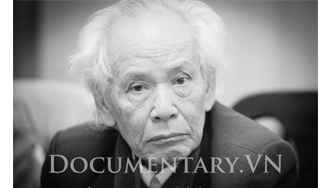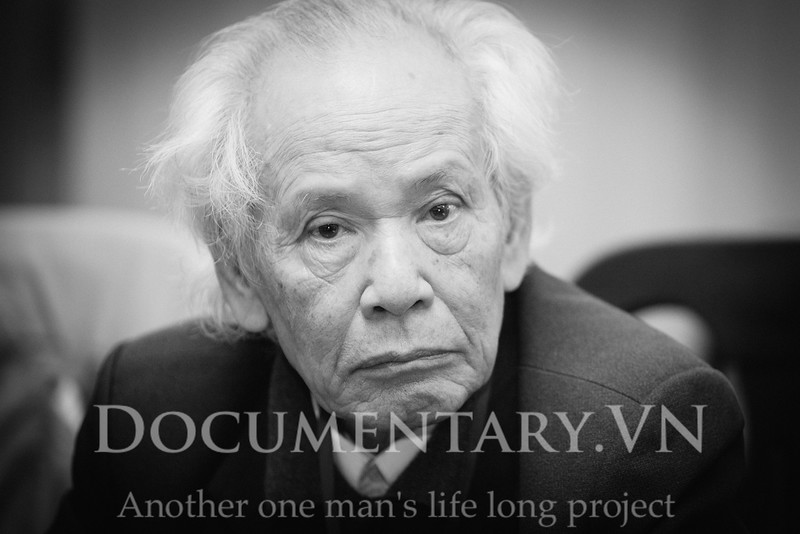
Professor Dinh Xuan Lam was born on February 4, 1925, in Son Tan commune, Huong Son district, Ha Tinh province, into a family of patriotic officials. His homeland is a land of "spiritual and talented people," where the legendary physician Hai Thuong Lan Ong practiced medicine and saved lives, and where the top-ranking scholar and Doctor of Philosophy Phan Dinh Phung, along with peasant leader Cao Thang, established a base for the Can Vuong movement to resist the French for over a decade. He was born amidst a nationwide movement of fervent struggle for freedom and democracy, demanding that the French colonialists pardon the patriot Phan Boi Chau.

Professor, People's Teacher Dinh Xuan Lam - a leading expert in modern and contemporary history/Photo: Thanh Long
His father was appointed as the Prefect of Thanh Hoa province by the Nguyen dynasty, so at just 9 months old, he and his family moved to Thanh Hoa and lived there throughout his childhood and adolescence until he went to study in the imperial capital of Hue. Later, his wife, Hoang Thi Qui, was also from Thanh Hoa, so it is no coincidence that he considered Thanh Hoa his second home.
In 1945, he graduated with a full Baccalaureate in Philosophy and Literature from Hue National High School, just as the August Revolution broke out and achieved victory. The success of the August Revolution changed both his perspective and his life. Witnessing firsthand the overwhelming power of the masses during the General Uprising, especially the righteous and compassionate attitude of the Viet Minh leaders commanding the uprising to seize power in Thanh Hoa, he was deeply moved and began enthusiastically participating in the patriotic movement. During the resistance against the French, he taught at the secondary and high school levels while also participating in youth organizations in many schools in Thanh Hoa province. His lectures, dignified demeanor, and elegant manner captivated countless students during his years teaching there.
The victory at Dien Bien Phu and the Geneva Accords of 1954 ended the nine-year resistance war against French colonialism, restoring peace to half of the country. After the liberation of the North, he was sent to study Literature at the Teacher Training University, in the History and Geography class with Phan Huy Le and Tran Quoc Vuong. In 1956, the four students, Dinh Xuan Lam, Phan Huy Le, Ha Van Tan, and Tran Quoc Vuong, graduated with honors and were all retained as teaching staff at the University.
Throughout his half-century of teaching, Professor Dinh Xuan Lam trained thousands of students, successfully supervised dozens of doctoral candidates, and was loved and respected by generations of students, who regarded him as one of the "four pillars" of the History Department at Hanoi University (now the University of Social Sciences and Humanities, Vietnam National University, Hanoi). He belonged to the generation that laid the foundation and was a leading expert in Marxist historiography in Vietnam. Anyone who studied with, met, or worked with Professor Dinh Xuan Lam felt that he was an intelligent and erudite man, yet very approachable and simple. He lived calmly, humbly, and tolerantly, open and sincere with everyone, both colleagues and students. His character and demeanor reflected the straightforwardness and sincerity of the people of Nghe An, combined with the subtlety and etiquette of Hue culture, which he had been deeply connected to during his time at the National School. And, most notably, his soul was rich in the romanticism, compassion, and elegance of French culture. His talent, erudition, and unpretentious nature created the image of a teacher who was both noble and refined, yet simple, approachable, and humble.
With his prolific writing skills and over half a century of tireless research, Professor Dinh Xuan Lam left behind a vast scientific legacy, comprising approximately 400 scientific works (including books, textbooks, articles, and scientific reports). His scientific talent bore fruit early on, shortly after graduating from university. In 1959, less than three years after beginning to teach at the History Department, he and several young colleagues, under the guidance of the master historian Professor Tran Van Giau, compiled and published a series of books.Modern history of Vietnam(4 volumes). This was the first modern history textbook series highly regarded by historians for its scientific quality, and was used to teach history students at many universities for several decades afterward. In 1998, despite being 73 years old, Professor Dinh Xuan Lam still wrote articles and participated in scientific conferences, and most importantly, he took on the role of chief editor of the book.General history of Vietnam(Volume 2) in the four-volume series of the same name published by the Education Publishing House. This series has been reprinted 14 times to date and is used as a textbook in universities and colleges. Furthermore, in 2012, the series...History of Vietnam(Volume 3), edited by Professor Dinh Xuan Lam, is now available to readers. This book series is still considered the most complete, up-to-date, and highest-quality among university textbooks on Vietnamese history during the colonial period.
It can be said that Professor Dinh Xuan Lam's research topics are rich and diverse. He has achieved success in every area and left a profound mark. However, his longest-lasting and most successful research direction, which contributed to establishing his position as a leading expert in modern Vietnamese history, is his work on colonialism and the anti-colonial movement of the Vietnamese people from the late 19th to the early 20th century.
In particular, he was very interested in and enthusiastic about researching the biography and career of President Ho Chi Minh. Based on numerous sources and insightful, rigorous analysis, he not only helps readers understand some prominent characteristics in Nguyen Ai Quoc's thought, but also attempts to find and decipher the deep origins and attributes that governed Ho Chi Minh's entire life and thought through articles such asWestern culture – one of the sources that shaped Ho Chi Minh's worldview, Ho Chi Minh's patriotism – the dialectical combination of tradition and modernity.It can be said that, in the study of Ho Chi Minh in Vietnam, Professor Dinh Xuan Lam is one of the pioneers and has achieved many remarkable successes.
Studying historical figures is one of Professor Dinh Xuan Lam's strengths. Through diligent fieldwork and research of numerous domestic and international sources, he has discovered and provided new insights, not only about the origins of their homeland and family, but also offered objective and comprehensive assessments of their contributions and roles in Vietnamese history. Furthermore, with his extensive research experience, Professor Dinh Xuan Lam offers many insightful methodological opinions on the study and evaluation of historical figures, especially those whose understanding within the academic community remains inconsistent. He was extremely serious, even with himself, when changing his perspective on certain historical figures such as Phan Thanh Giản, Nguyễn Trường Tộ, Lưu Vĩnh Phúc, etc. His research works reflect the sense of responsibility, courage, and selfless compassion of a talented scientist who cared deeply for his people and his country.
Professor, Doctor, People's Teacher Nguyen Van Khanh
|
PROFESSOR, PEOPLE'S TEACHER DINH XUAN LAM
+ Workplace: Department of History (Hanoi University). + Management position: Former Head of the Department of Modern and Contemporary Vietnamese History, Faculty of History.
History of Vietnam during the period 1897 - 1914(co-authored), Construction Publishing House, Hanoi, 1957. Hoang Hoa Tham and the Yen The peasant movement(co-authored), Culture Publishing House, Hanoi, 1958. Poetry and prose by Nguyen Quang Bich(co-authored), Culture Publishing House, Hanoi, 1962. Modern history of Vietnam(co-author), Education Publishing House, Hanoi, 1959. From Ba Dinh to Hung Linh, Thanh Hoa Publishing House, 1985;Thanh Hoa CityThanh Hoa, 1990. Ho Chi Minh's thought on building Vietnamese culture, National Political Publishing House, Hanoi, 1998. Contributing to the understanding of Ho Chi Minh's life and thought., National Political Publishing House, Hanoi, 2005. Hanoi during the national liberation movement in the late 19th and early 20th centuries., Hanoi Publishing House, Hanoi, 2010. The revolutionary patriotic movement of the early 20th century: Figures and events, Labor Publishing House, Hanoi, 2012. |
http://news.zing.vn/tu-tru-su-viet-gs-dinh-xuan-lam-qua-doi-o-tuoi-92-post716480.html
http://vietnamnet.vn/vn/giao-duc/khoa-hoc/giao-su-dinh-xuan-lam-ban-linh-mot-su-gia-353864.html
http://tuoitre.vn/tin/giao-duc/20170126/giao-su-su-hoc-dinh-xuan-lam-qua-doi-o-tuoi-92/1257568.html
http://dantri.com.vn/su-kien/giao-su-su-hoc-dinh-xuan-lam-qua-doi-20170125225340645.htm
http://vov.vn/xa-hoi/giao-su-dinh-xuan-lam-qua-doi-o-tuoi-92-589149.vov
Author:Professor, Doctor, People's Teacher Nguyen Van Khanh
Newer news
Older news